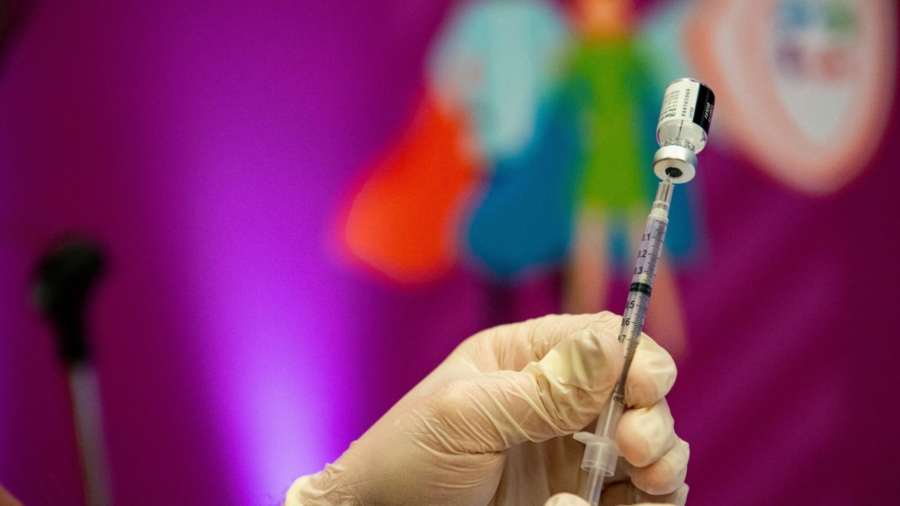Pfizer and BioNTech have completed an application for emergency use authorization (EUA) to the Food and Drug Administration (FDA) for a three-dose COVID-19 vaccine regimen for children aged 6 months to under 5 years old.
Pfizer announced the completion of its EUA application on Wednesday, reported multiple outlets.
The companies initially asked the FDA for an EUA in February for a two-dose regimen of its 3-µg COVID-19 vaccine for the age group, but the agency on Feb. 11 postponed its decision on the application until receiving data on three doses. On the same day, Pfizer-BioNTech announced it would delay completing its EUA request until it receives data on the third dose.
The 3-µg dose of the Pfizer-BioNTech vaccine for the under-5 age group is one-tenth of the dose adults receive (30 µg) and one-third of that given to children aged 5–11 (10 µg).
The FDA has since accepted the application to review the data from Pfizer-BioNTech, reported ABC News. The agency said Wednesday it will review the EUA request “as quickly as possible using a science-based approach.”
Pfizer noted in a statement on May 23 that it has gathered “safety, immunogenicity, and vaccine efficacy data” from its Phase 2/3 trial. The trial showed that a third 3-µg dose of the Pfizer-BioNTech COVID-19 vaccine “elicited a strong immune response, with a favorable safety profile similar to placebo” in children 6 months to under 5 years of age, Pfizer said.
The vaccine was also 80.3 percent effective in preventing COVID-19 symptoms according to the study, the companies stated. They noted that the figure is based on 10 symptomatic COVID-19 cases “from seven days after the third dose and accrued as of April 29, 2022.”
At least 21 cases are needed to formally determine whether the vaccine is effective. “Final vaccine efficacy data will be shared once available,” the companies said.
In the Phase 2/3 trial, a third dose of the vaccine was given to 1,678 children “at least two months after the second dose at a time when Omicron was the predominant variant.” The third dose appeared to elicit an antibody response enough to meet the FDA criteria for emergency use of the vaccine, the companies said.
“Three 3-µg doses of the Pfizer-BioNTech COVID-19 Vaccine was well-tolerated in this age group, and no new safety signals were identified,” they added. “The majority of adverse events were mild or moderate.”
Albert Bourla, Pfizer’s chairman and CEO, said that the company is “pleased” that the vaccine “was well tolerated and produced a strong immune response.”
Ugur Sahin, CEO and co-founder of BioNTech, said that the study suggests that the vaccine “provides young children with a high level of protection against the recent COVID-19 strains.”
Children aged 5 and under comprise the only age group in the United States currently not FDA-eligible for any COVID-19 vaccination.
A poll from the Kaiser Family Foundation in April found that “[o]ne in five parents of children under 5 [18 percent] are eager to vaccinate their child and say they will do so right away once a COVID-19 vaccine is authorized for their age group.”
The FDA announced Wednesday that it would hold a meeting on June 15 for its independent advisory panel, the Vaccines and Related Biological Products Advisory Committee, to discuss the EUA request from Pfizer.
The same committee on June 15 will also be discussing Moderna’s EUA application for the company’s vaccine, intended for those 6 months to under 6 years old.
Moderna is seeking authorization for a two-dose regimen of its vaccine, each containing 25 µg, which is a quarter of the dose for those aged 12 and above (100 μg) in the primary course of the vaccine.
The vaccine’s effectiveness in preventing infection, including asymptomatic and mild infection, from the SARS-CoV-2 virus for those aged 6 months to 2 years was only 51 percent, and for those aged 2 to under-6 years was 37 percent, Moderna said in late April.
The vaccines from Pfizer-BioNTech and Moderna are both based on mRNA technology. The COVID-19 vaccines from these companies have been linked with heart inflammation, including myocarditis and pericarditis, cumulative data from around the world have suggested.
Younger populations, especially young men, have been observed to experience these conditions at much higher than expected rates, data from the CDC previously suggested. A small number of deaths from heart inflammation after COVID-19 vaccine have been reported.
Liz Mumper, a pediatrician and former medical director of the Autism Research Institute, told the Children’s Health Defense in an interview that natural immunity provides a much more durable and broader protection for children than vaccines.
She also said that if a child contracts COVID-19, they not only don’t need the vaccine but also might be at higher risk of adverse effects if they are made to take them.
“If kids don’t need the vaccines, we do not want to give them the vaccines because we do not have long-term studies on the side effects, and the short-term information we have is actually quite a bit concerning to me,” Mumper said. The interview host pointed out that the COVID-19 survival rate among children is 99.98 percent.
Vaccine manufacturers are immune from liability for any adverse reactions—unless there’s “willful misconduct” involved. Vaccine providers are required to report any serious adverse effects or vaccination administration errors to VAERS, hosted by the U.S. Department of Health and Human Services.
The federal government has a countermeasures program that can compensate eligible persons who suffer serious injury from approved vaccines. But the burden of proof has proven a challenging process.
Naveen Athrappully and Zachary Stieber contributed to this report.
From The Epoch Times


